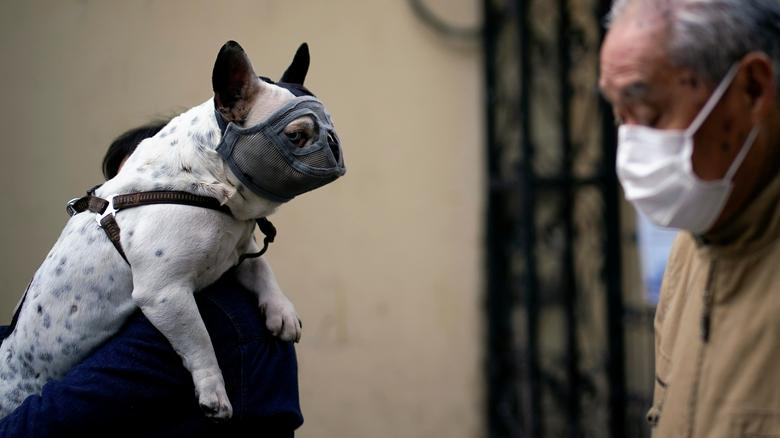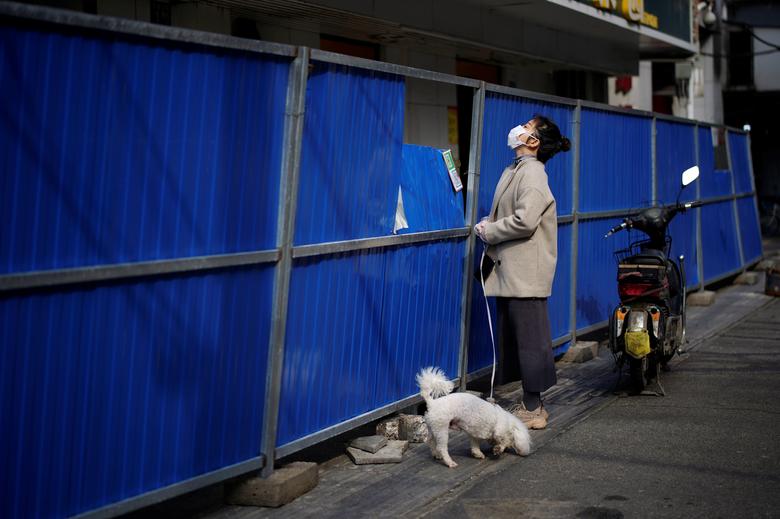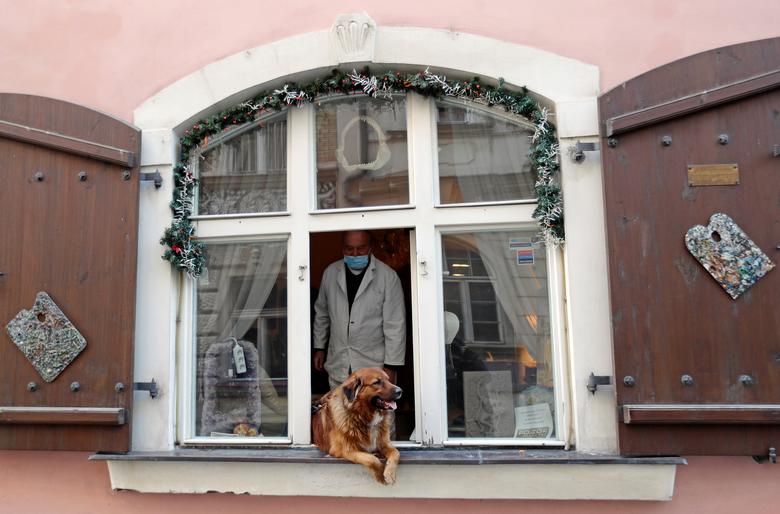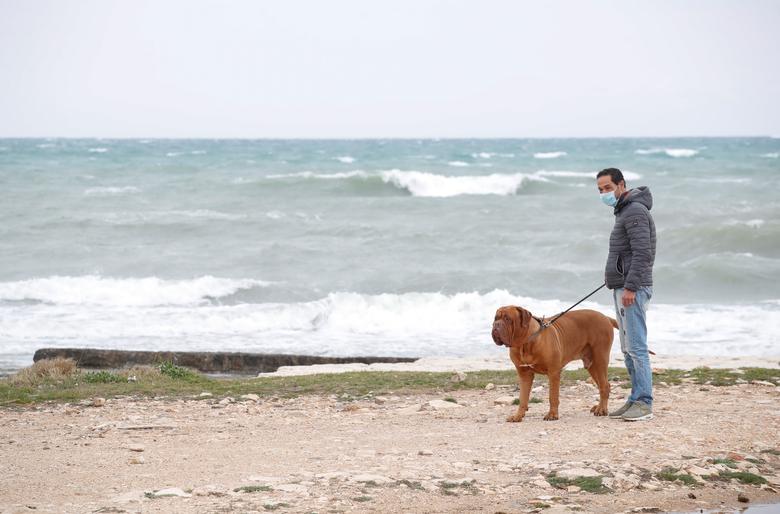
A dog wears a mask on a street in Shanghai, China, March 22, 2020. /Reuters
A dog wears a mask on a street in Shanghai, China, March 22, 2020. /Reuters
As countries started closing airports to control the coronavirus pandemic, Jiabin, a Chinese student in Australia, was fortunate to book a flight out of the country. This luck didn't apply to his most prized possession: Rennie, a ragdoll cat.
With flight operators not allowing pets to fly, thousands of Chinese students and professionals scrambled to find friends and relatives to take care of their animals. The other two options were abandoning them or pay hundreds of dollars to transport their beloved pets to the Chinese mainland.
Jiabin selected the latter. Friends recommended Easy Pet Flight and its Facebook page claimed hassle-free transportation of animals to China.
"They assured me that my cat would be shipped from Brisbane to Shanghai via Hong Kong and take around 45 days to reach the final destination. I paid 3,500 Australian dollars (2,500 U.S. dollars)," said Jiabin. With the deal closed, he felt relieved and boarded the flight. He would be home, and his cat would soon follow him.
On August 12, Rennie landed in Hong Kong. The agent sent several pictures of the cat, who had been checked into a pet hotel. As the border between Hong Kong and the Chinese mainland closed, the company told its customers about the delay. But two weeks later, the agency sent a message. We have lost the cat, it read.
"I still don't know her whereabouts. I don't know whether she is dead or alive," he said.

A woman wearing a face mask waits with a dog for items to be delivered through barricades set up to block buildings from a street in Wuhan, China, April 1, 2020. /Reuters
A woman wearing a face mask waits with a dog for items to be delivered through barricades set up to block buildings from a street in Wuhan, China, April 1, 2020. /Reuters
Pandemic exposes pet smuggling racket
Globally, more than four million pets and other live animals are transported by air every year.
Like humans, travel restrictions also apply to pets, separating dogs, cats and birds from their owners for months. The situation has also affected legal pet transporters, said the International Pet and Animal Transportation Association (IPATA), a non-profit.
The situation was perfect for illegal pet transportation operators to step into the gap and exploit students and professionals desperate to transport their pets. Most owners were assured that their pets would be flown into Hong Kong and then be driven to their hometown on the Chinese mainland.
Britanny, a Chinese student in New York, who prefers not to reveal her last name, chose Jack Pet to fly her dog, Curry, after securing a flight ticket to her home town. The company's Hong Kong office informed her that the dog had run away from their facility. "It's untraceable," the firm said.

Brittany's dog, Curry, is a likely victim of the illegal trade. /Courtesy of Brittany
Brittany's dog, Curry, is a likely victim of the illegal trade. /Courtesy of Brittany
With claims of pets getting lost in transit mounting, the victims – working or studying in countries like the U.S., Australia, Canada, and many other international destinations – approached the Hong Kong police to lodge complaints.
In Hong Kong, earlier, the police, along with customs officials, had launched anti-smuggling operations. In one case, they seized 12 dogs along with 37 million Hong Kong dollars (4.7 million U.S. dollars) worth of goods. The discovery of pets among the illegal consignments have stunned law enforcement agencies and experts working in the live animal transportation sector.
During one of the operations, smugglers, fearing being caught red-handed, allegedly threw the animals, still locked inside their cages, in the ocean. Unable to swim, they drowned and their floating carcasses shocked locals. Many owners are still waiting for their pets to arrive from abroad. Many fear their beloved animal might have become a victim of the illegal trade.
Hong Kong Police are still investigating whether the pets were being taken to the Chinese mainland to be reunited with their owners after being shipped from overseas to Hong Kong.
Low-level of awareness about transnational pet transportation
"Things are different with COVID, right now," Dr. Gerry Pahl, executive board member, IPATA, told CGTN. Usually, it's easy to transport pets from international locations to the Chinese mainland, he added. There are direct flights and in many cases, they are dispatched through Hong Kong to various provinces of China through road links. But the border closure has made things difficult.
"As far as I know, in Hong Kong, there's never been or never been any hint of boat smuggling of pets from Hong Kong to the Chinese mainland because there's never been a need to do that," Pahl added.

A man wearing a face mask and his dog look out of a window in Prague, Czech Republic, March 24, 2020. /Reuters
A man wearing a face mask and his dog look out of a window in Prague, Czech Republic, March 24, 2020. /Reuters
But many experts claim the illegal pet trade was rampant in the region for decades. And lack of awareness among pet owners about certified live animal transportation services fuels this illicit trade.
"The pet smuggling racket has been operational between Hong Kong and the Chinese mainland for many years," said Mary Peng, CEO & founder of the International Center for Veterinary Services. "Coronavirus and anti-smuggling efforts have brought wider attention to this issue for the first time."
She also highlighted the culture of relying on agencies without verifying their credentials as one reason behind the flourishing pet smuggling sector.
"Overseas Chinese students and professionals may find it easier to use an agent from China to skip the language barriers. Local agents are often believed to offer lower prices and shortcuts that save money and time on the relocation process. The overseas or foreign agents will be operating in English or other languages and will usually charge full prices and would not offer shortcuts for relocating pets into China," she added.

A man wearing a protective mask walks his dog in Bari, Italy, March 31, 2020. /Reuters
A man wearing a protective mask walks his dog in Bari, Italy, March 31, 2020. /Reuters
Consumed with the rush to book a flight ticket, finding a foster family for their pet and panic around the viral outbreak led them to trust animal transportation companies recommended by friends, claimed pet owners.
They also highlighted a lack of comprehensive information about credible companies' transportation of pets. The gap led them to believe the claims made by various companies on their websites and social media accounts. "Also, there is no well-publicized agency or group that certifies pet transportation companies and offers a comprehensive website in Chinese," said Peng.
"Moreover, we never heard about the illegal smuggling of pets. We are indeed responsible for the tragedies and we should have done more research," said Jiabin. "But we didn't abandon the pets in Australia. We tried to bring them home. We love our pets deeply."
The incident has prompted IPATA to raise awareness and it has issued advisories on its website, advising pet owners. "Pet owners who are relocating or traveling with their pets wait, if that is an option."
If an owner wants to bring back pets to their choice of destination, then the duration and cost of the service might be on the higher side, IPATA said.
Meanwhile, Easy Pet Flight's website is not accessible and an employee from Jack Pet said the company has stopped its operation.
Jiabin is still hopeful of reuniting with Rennie.